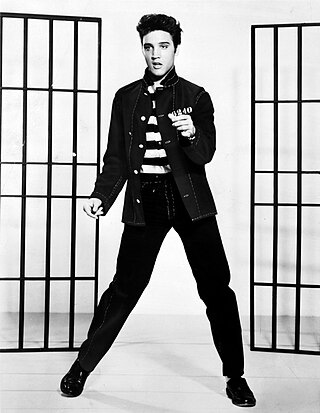
Elvis Aaron Presley, often referred to mononymously as Elvis, was an American singer and actor. Known as the "King of Rock and Roll", he is regarded as one of the most significant cultural figures of the 20th century. Presley's energized interpretations of songs and sexually provocative performance style, combined with a singularly potent mix of influences across color lines during a transformative era in race relations, brought both great success and initial controversy.

"A Little Less Conversation" is a 1968 song recorded by American singer Elvis Presley, written by Mac Davis and Billy Strange and published by Gladys Music, Inc., originally performed in the film Live a Little, Love a Little. The song became a minor hit in the United States when released as a single with "Almost in Love" as the A-side. A 2002 remix by Dutch musician Junkie XL of a later re-recording of the song by Presley became a worldwide hit, topping the singles charts in nine countries and was awarded certifications in ten countries by 2003.

"Burning Love" is a 1972 song by Elvis Presley, written by Dennis Linde, originally released by Arthur Alexander earlier in 1972. Presley found major success with the song, it becoming his final Top 10 hit in the American Hot 100 or pop charts, peaking at number 2.

"All Shook Up" is a song recorded by Elvis Presley, published by Elvis Presley Music, and composed by Otis Blackwell. The single topped the U.S. Billboard Top 100 on April 13, 1957, staying there for nine weeks. It also topped the Billboard R&B chart for four weeks, becoming Presley's second single to do so, and peaked at No. 1 on the country chart as well. It is certified 2× platinum by the Recording Industry Association of America.

"Jailhouse Rock" is a rock and roll song recorded by American singer Elvis Presley for the film of the same name. It was written by Jerry Leiber and Mike Stoller. RCA Victor released the song on a 45 rpm single on September 24, 1957, as the first single from the film's soundtrack EP. It reached the top of the charts in the U.S. and the top 10 in several other countries. The song has been recognized by the Grammy Hall of Fame, the American Film Institute, and others.
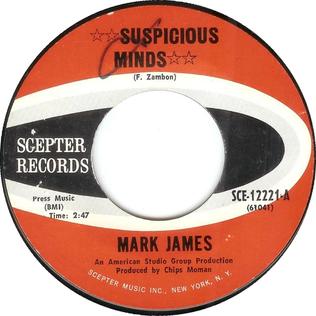
"Suspicious Minds" is a 1968 song written and first recorded by the American songwriter Mark James. After this recording failed commercially, it was recorded by Elvis Presley with the producer Chips Moman. Presley's version reached No.1 on the US Billboard Hot 100, his 18th and final no. 1 single on that chart. In 1999, Presley's RCA Victor Records version was inducted into the Grammy Hall of Fame.
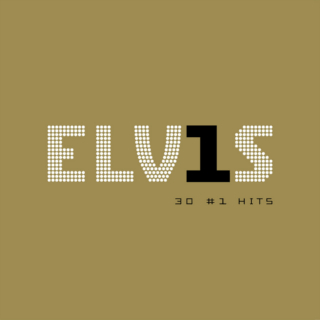
Elvis: 30 #1 Hits is a greatest hits collection of songs by American rock and roll singer Elvis Presley. It was released by RCA Records on September 24, 2002. It is the first Elvis Presley album to feature the remix of "A Little Less Conversation" by JXL that was released earlier in the year and reached No. 1 in the UK, Australia and went on to become a number-one hit in over 20 countries.

"Can't Help Falling in Love" is a song written by Hugo Peretti, Luigi Creatore, and George David Weiss and published by Gladys Music, Inc. The melody is based on "Plaisir d'amour", a popular French love song composed in 1784 by Jean-Paul-Égide Martini. The song was initially written from the perspective of a woman as "Can't Help Falling in Love with Him", which explains the first and third line ending on "in" and "sin" rather than words rhyming with "you".
"Always on My Mind" is a ballad written by Wayne Carson, Johnny Christopher, and Mark James, first recorded by Brenda Lee and first released by Gwen McCrae in March 1972. Lee's version was released three months later in June 1972. The song has been a crossover hit, charting in both the country and western and pop categories. Elvis Presley's recording was the first commercially successful version of the song.

"I Will Always Love You" is a song written and originally recorded in 1973 by American singer-songwriter Dolly Parton. Written as a farewell to her business partner and mentor Porter Wagoner, expressing Parton's decision to pursue a solo career, the country single was released in 1974. The song was a commercial success for Parton, twice reaching the top spot of the US Billboard Hot Country Songs chart: first in June 1974, then again in October 1982, with a re-recording for The Best Little Whorehouse in Texas soundtrack.
"Blue Moon" is a popular song written by Richard Rodgers and Lorenz Hart in 1934 that has become a standard ballad. Early recordings included those by Connee Boswell and by Al Bowlly in 1935. The song was a hit twice in 1949, with successful recordings in the U.S. by Billy Eckstine and Mel Tormé.

"Are You Lonesome Tonight?" is a song written by Roy Turk and Lou Handman in 1926. It was recorded several times in 1927—first by Charles Hart, with successful versions by Vaughn De Leath, Henry Burr, and the duet of Jerry Macy and John Ryan. In 1950, the Blue Barron Orchestra version reached the top twenty on Billboard's Pop Singles chart.
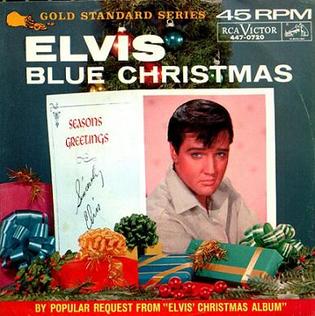
"Blue Christmas" is a Christmas song written by Billy Hayes and Jay W. Johnson and most famously recorded by Elvis Presley, although it was first recorded by Doye O'Dell in 1948. It is a tale of unrequited love during the holidays and is a longstanding staple of Christmas music, especially in the country genre.

"Moody Blue" is a song made famous by Elvis Presley. The song was written by Mark James who recorded the original version of the song, which reached #15 in South Africa during the summer of 1976. James also penned Elvis' "Suspicious Minds".
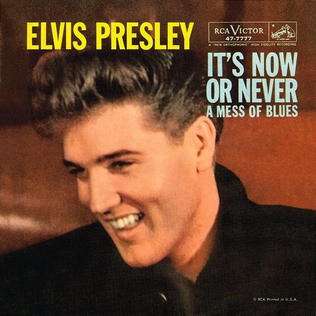
"It's Now or Never" is a song recorded by Elvis Presley and released as a single in 1960. The song is one of the best-selling singles by Presley, and one of the best-selling physical singles of all time. It was recorded by Bill Porter at RCA Studio B in Nashville. It is written in E major and has a tempo of 80 BPM.

"Hurt" is a 1954 song by Jimmie Crane and Al Jacobs. "Hurt" was originally performed by Roy Hamilton, whose version peaked at number eight on the R&B Best Seller chart and spent a total of seven weeks on the chart. A version by Ricky Denell also received considerable radio airplay in 1954 on pop radio stations. The song is considered to be the signature hit of Timi Yuro, whose version went to number four on the Billboard pop chart in 1961. Elvis Presley’s 1976 version reached the top 40 on the Billboard Hot 100 and the top 10 on Billboard’s Hot Country Singles chart. Juice Newton's 1985 version scored number one on Billboard's Country chart.

The singles discography of Elvis Presley began in 1954 with the release of his first commercial single, "That's All Right". Following his regional success with Sun Records, Presley was signed to RCA Victor on November 20, 1955. Presley's first single with RCA, "Heartbreak Hotel", was a worldwide hit, reaching the No. 1 position in four countries and the top 10 in many other countries. Other hit singles from the 1950s include "I Want You, I Need You, I Love You", "Don't Be Cruel", "Hound Dog", "Love Me Tender", "Too Much", "All Shook Up", "(Let Me Be Your) Teddy Bear", "Jailhouse Rock", "Don't", "Wear My Ring Around Your Neck", "Hard Headed Woman", "One Night", "(Now & Then There's) A Fool Such as I", and "A Big Hunk o' Love". On March 24, 1958, Presley entered the United States Army at Memphis, Tennessee, and was stationed in Germany. He left active duty on March 5, 1960.
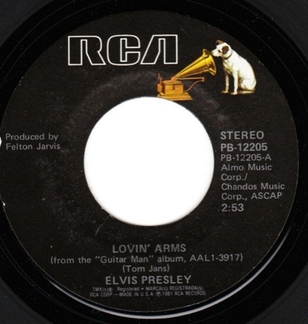
"Loving Arms" is a song written by Tom Jans and first recorded as a duet by Kris Kristofferson and Rita Coolidge for their 1973 album Full Moon.



















